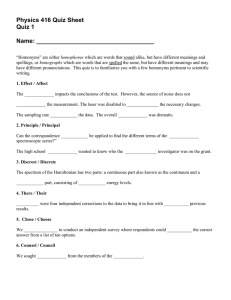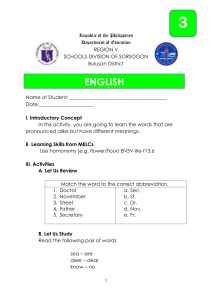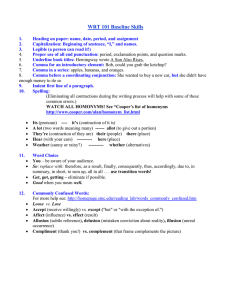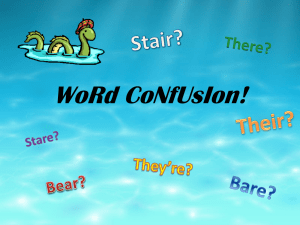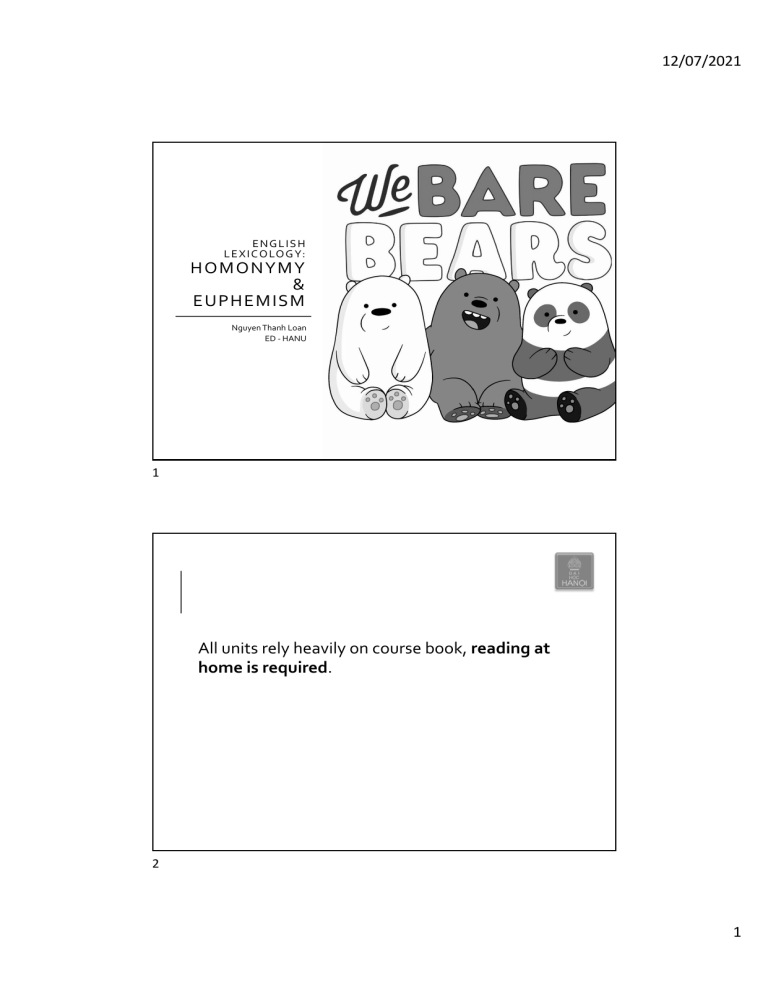
12/07/2021
ENGLISH
L E X I C O LO G Y:
HOM ONYM Y
&
EUPHEM ISM
Nguyen Thanh Loan
ED - HANU
1
All units rely heavily on course book, reading at
home is required.
2
1
12/07/2021
HOMONYMY
Homonymy (from Gr.—homos, “same”; onoma, “name”)
Homonymy = The sound (pronunciation) or spelling is
identical, whereas the meaning is different and unrelated.
Homonymy is a language universal (= All languages have
homonyms).
While synonyms and antonyms can be regarded as the
treasury of a language’s expressive resources, homonyms are
of no interest in this respect.
Often found in wordplay/ puns and riddles.
3
HOW DO YOU UNDERSTAND
THESE SENTENCES?
One guy won the game.
He leads me through the crowd so I can get to buy pencil
leads.
I heard that John has resigned from his Director position, is
that true? – No, he resigned his contract to stay there for 3
more years.
When she saw her first strands of grey hair, she thought
she’d dye.
A bicycle can’t stand on its own because it’s two-tired.
4
2
12/07/2021
TRADITIONAL
CLASSIFICATION
(BY W. W. SKEAT)
Homonyms proper/ Perfect homonyms: words that are
identical in both pronunciation and spelling.
E.g.: minute – minute;
Homophones: words that are identical in sound but of different
spelling.
E.g.: two – too;
Homographs: words that are the same in spelling but different
in sound.
E.g.: live (a) – live (v);
5
TRADITIONAL
CLASSIFICATION (CONT.)
Sound
Spelling
Homonyms
proper
Same
Same
Homophones
Same
Different
Homographs
Different
Same
Different
meaning!!!
6
3
12/07/2021
A. I. SMIRNITSKY’S
CLASSIFICATION
Professor A. I. Smirnitsky classified homonyms into two
large classes: full homonyms and partial homonyms.
Notes:
-Paradigm: the set of all word-forms of a word.
-Form: can refer to sound-form (pronunciation) or
graphic-form (spelling)
7
A. I. SMIRNITSKY’S
CLASSIFICATION
Professor A. I. Smirnitsky classified homonyms into two
large classes: full homonyms and partial homonyms.
1. Full homonyms (i.e. homonymy of words)
Perfect homonyms:
­ Words belong to the same part of speech and have the
same paradigm.
E.g.:
seal /siːl/ (1), n: “a sea animal”
seal /siːl/ (2), n. “an official stamp or mark”
row /rəʊ/ (1), n. “a number of object arranged in a line”
row /raʊ/ (2), n. “a quarrel or argument”
8
4
12/07/2021
SMIRNITSKY’S
CLASSIFICATION (CONT.)
2. Partial homonyms: subdivided into three subgroups.
Only some individual word-forms are homonymous, the whole of the
paradigm is not identical.
a. Simple lexico-grammatical partial homonyms: Words of the same
parts of speech & their paradigms have one identical form.
E.g.: found (v) - found (v, pst & pp. of to find) :
­ found: {found, founds, founding, founded, founded}
­ find: {find, finds, found, found}
Others: wound (v) - wound (v, pst & pp. of to wind)
9
SMIRNITSKY’S
CLASSIFICATION (CONT.)
b. Complex lexico-grammatical partial homonyms: words of
different parts of speech. Their paradigms have one identical form
(sound form or graphic form). E.g.:
way (n) – to weigh (v) /weɪ/
rose (n) – rose (v, pst of to rise) /rəʊz/
practice (n) – practise (v) /præktɪs/
bean (n) – been (v, pp. of to be) /bi:n/
maid (n) – made (v, pst. of to make) /meɪd/
for (p) – for (conj.) /fɔ:/
10
5
12/07/2021
SMIRNITSKY’S
CLASSIFICATION (CONT.)
c. Partial lexical homonyms: words of the same category of parts
of speech which are identical only in their original forms.
­ to lie: {lied, lied}
­ to lie: {lay, lain}
Only two forms lie /laɪ/ and lies /laɪz/ are homonymous, the rest are
different. Others:
to can (could), aux. v – to can (canned, canned), v
to hang (hung, hung), v – to hang (hanged, hanged), v
11
SMIRNITSKY’S CLASSIFICATION:
PARTIAL HOMONYMS - RECAP
Partial
homonyms
Part of
speech
Form
Simple lexicogrammatical
partial homonyms
Same
One identical form in their
paradigms.
Complex lexicogrammatical
partial homonyms
Different
Partial lexical
homonyms
Same
One identical form in their
paradigms
Different
meaning!
Identical only in their
original form
12
6
12/07/2021
A DIFFERENT CLASSIFICATION
OF HOMONYMS (REFERENCE)
Examples
Sound
Spelling
Homonyms
Words that have the same form but
different meanings
Homophones
Great – grate
Fair (n) – fair (adj)
Same
Same or
different
Homographs
Content (n)content (adj)
Same or
different
Same
Heteronyms
Lead (v) – lead (n)
Different
Same
Heterographs
Bare - bear
Same
Different
Different
meaning!
13
IN POPULAR CULTURE
14
7
12/07/2021
HOMONYMY VS. POLYSEMY
(READ AT HOME)
"There is an extensive gray area between the concepts of polysemy
and homonymy”
(Concise Oxford Companion To The English Language, 2005)
Homonymy vs. Polysemy:
The distinction between homonymy and polysemy can NOT be
drawn precisely.
A criterion for distinguishing polysemous and homonymic
expressions is a historical or conceptual relationship between the
words: Words that have the same historical origin or are related
conceptually are said to be polysemous.
15
HOMONYMY VS. POLYSEMY
(CONT.)
Both homonymy and polysemy are possible sources of
lexical ambiguity.
Historical (diachronic) view: a historical change in the
semantic structure of the word à disappearance of
some meanings/new meanings being added to the ones
already existing/ rearrangement of these meanings in its
semantic structure.
Synchronic view: the coexistence of the various
meanings of the same word at a certain historical period,
and the arrangement of these meanings in the semantic
structure of the word.
16
8
12/07/2021
ORIGINS OF HOMONYMS
Homonyms are derived from 2 main sources:
1. The homonyms derived from various roots (e.g. through
Phonetic convergence, Borrowing, Conversion) à most
potent factor in the creation of homonyms.
2. The homonyms derived from one root (e.g. through
Semantic divergence)
17
ORIGINS OF HOMONYMS
1. Sound change (Phonetic
convergence )
Etymologically unrelated words
became homonyms due to sound
change.
§Knight (OE., cniht) /kniht/
§Night /naɪt/
oFair (OE. fæger, “beautiful, blond”)
oFair (Ofr.. feire, “holiday”)
18
9
12/07/2021
ORIGINS OF HOMONYMS
(CONT.)
2. Borrowing
a. One word is borrowed from another source
­ mean (“average”, from Lat. medianus)
­ mean (“think”, from OE. marnan)
­ mean (“unkind”, from OE. gemǣne)
b. All words in the set of homonyms are borrowed
­ piece (“fragment”, from OFr. piece, from Lat. pecia)
­ peace (“peace”, from OFr. pais, from Lat. păx)
19
Right, wright, write are native words; rite is a Latin borrowing (Lat. – ritus);
20
10
12/07/2021
ORIGINS OF HOMONYMS
(CONT.)
3. Word-building
Conversion - the process by which one lexical item changes its
morphological class without changing its form, accounts for a great
number of homonyms.
* By default, words created by conversion are homographs.
e.g.:
record /ˈrekərd/ (n) à to record /rɪˈkɔːd/(v)
green (n) à to green (v)
Others: Shortening, Affixation, Sound imitation
e.g.:
relationship (n) à to ship (v)
resign /rɪˈzaɪn/ (v) – resign /rɪˈsaɪn/ (v)
21
ORIGINS OF HOMONYMS
(CONT.)
BOARD (n)
4. Semantic divergence/ Split
polysemy
Remember the System of
meaning?
Some meanings of polysemous
words have deviated so far from
each other that they have
gained an existence as separate
words.
à They become homonyms.
Others: bank; spring; etc.
x
II
daily meals
(i.e. “meals
served at the
table”)
I
long, thin
piece of wood
(now replaced
by table (from
OFr.)
x
III
an official
group of people
who direct
some activity
(e.g. board of
directors)
22
11
12/07/2021
CLASSIFY THESE
HOMONYMS
cereal - serial
dual – duel
converse - converse
stationary – stationery
mew - mew
23
EXPLAIN THE HOMONYMS WHICH
FORM THE BASIS FOR THE
FOLLOWING JOKES. CLASSIFY THE
TYPES
1. Police officer: Don't you see that sign "Fine for parking"?
Driver: Yes, officer, I see and agree with it.
2. “Waiter, will the pancakes be long?" - "No, sir, round.”
3. - "I spent last summer in a very pretty city in Switzerland.”
- "Berne?”
- "No, I almost froze."
4. What do you call a deer with no eyes?
- No idea.
What do you call a deer with no eyes and no legs?
- Still no idea.
24
12
12/07/2021
EXPLAIN WHY THESE WORDS
BECAME HOMONYMS
1.
a.
She left her fan at home.
b.
John is a football fan.
2.
a.
There’s no need to give up hope so soon.
b.
Don’t knead the dough too long when you make bread.
3.
a.
Do you know how to block the ads on Youtube videos?
b. Rise in virus cases adds to economic uncertainty ahead of U.S.
election.
25
EUPHEMISM
“Euphemisms are unpleasant truths
wearing diplomatic cologne”
- Quentin Crisp -
26
13
12/07/2021
WHAT DO THE ITALICIZED
WORDS MEAN?
“I'd like to pay a visit to the smallest room of the house.”
“I used to think I was poor. Then they told me I wasn’t poor, I was
needy. Then they said it was self-defeating to think of myself as
needy, that I was culturally deprived. Then they told me deprived
was a bad image, that I was underprivileged. Then they told me that
underprivileged was overused, that I was disadvantaged. I still don’t
have a dime but I have great vocabulary.”
Other words: food-insecure; low-income
“- Guys, I feel very terrible about what I'm about to say. But I'm
afraid you're both being let go.
- Let go? What does that mean?
- It means you're being fired, Louie.”
27
WHAT IS EUPHEMISM?
Euphemism /ˈjuːfəmɪzəm/ (from Gr. euphemia) refers to
the use of “words of good omen”.
Euphemism has been used since ancient times; the
subject of use is undoubtedly religious.
Euphemism is the substitution of a mild, indirect or
even a vague word or expression for an offensive, direct
or unpleasant one.
Euphemism exists in almost every language, every
culture à a language universal.
28
14
12/07/2021
REASONS TO USE
EUPHEMISM
- Euphemisms are used to help people tiptoe around what
makes them uneasy or embarrassing.
- Euphemisms soften the harsh, smooth the rough & make
what’s negative sound positive.
E.g.
a stupid man à not exactly brilliant
a child of low intelligence à an exceptional student
29
REASONS TO USE
EUPHEMISM (CONT.)
- Euphemistic discourse is used
to avoid taboos:
Ø Social taboos: governed by
social convention, customs,
common practices:
E.g.:
for mental illness = mentally
unstable, mentally challenged
jail = a correctional institution
drunk = tipsy, tight, flustered,
intoxicated
Ø Superstitious taboos:
euphemisms are used to avoid
calling things making ppl fear
(speaking of names of
supernatural beings).
E.g.:
Devil = the Prince of Darkness; the
black one
Hell = h-e-double hocky sticks;
heck; Sam Hill (as in What in the
Sam Hill?);
God (for Christians) = Gosh/Golly;
Gee
30
15
12/07/2021
REASONS TO USE
EUPHEMISM (CONT.)
Ø Political taboos: people are encouraged to use politically correct
terms to ensure equality, avoid offense or disadvantage to
members of particular groups in the society.
E.g.
policeman à police officer ; chairman à chairperson
he/him/his à he or she/him or her/his or hers
man, mankind à human beings
31
CHARACTERISTICS OF
EUPHEMISMS
1. Universality:
Nearly all cultures have some notions (conceptions) that people
want to avoid mentioning directly, e.g. death, war, disease, religion.
2. Localization/Culture specificity:
Euphemisms are culture-specific.
E.g. condom = French letter (BrE) – rubber (AmE)
Death euphemism:
- People living in coastal area: go with the tide
- People living in mountainous area: (to be gone) over the range
32
16
12/07/2021
CHARACTERISTICS OF
EUPHEMISMS (CONT.)
3. Contemporaneity
The change of language depends on the need
and change of the society.
E.g. 1:
The term negro in Harper Lee’s 1960 “To kill a
mocking bird” (“Giết con chim nhại”) refers to
black people.
Acceptable modern-day term: African-American.
E.g.2:
Historically, the terms for breeches (trousers)
included the inexpressibles, the unspeakables, the
unmentionables, etc.
33
E.g.3: Terms for Pregnancy over the years:
­ She has canceled all her social engagements (1855)
­ She is in an interesting condition (1880)
­ She is in a delicate condition (1895)
­ She is knitting little bootees (1910)
­ She is in a family way (1920)
­ She is expecting (1935)
­ She is pregnant (1956)
­ She is having a bun in her oven/ a bundle of joy (1960s - now)
34
17
12/07/2021
CHARACTERISTICS OF
EUPHEMISMS (CONT.)
4. Fuzziness
In many cases, people try to use fuzzy expressions (semantic
obscurity) to avoid saying the truth.
E.g.:
Blind à visually impaired, sight deprived
Sex change = gender reassignment/confirmation surgery
Old age = vintage/antique/time worn/out-of-date
35
CHARACTERISTICS OF
EUPHEMISMS (CONT.)
5. Sense of humor:
E.g. To die = to count worms, to kick the bucket
rain = sky juice; coffee = hot bean water; honey = bee sauce
dog = trainable cat; penguin = formal chicken; zebra = prison horse
to vomit = to make a floor pizza
36
18
12/07/2021
TYPES OF EUPHEMISM
1. Negative euphemisms: decrease negative values that are associated
with negative phenomena: war, drunkenness, crime, poverty, etc.
E.g.:
Prostitute à working girl
When an attack kills innocent people à collateral damage
when an army kills people on its own side, usually by accident.
à friendly fire
genocide à ethnic cleansing
2. Positive euphemisms: make referents look grander & more
acceptable than they really are.
E.g.:
doctor, nurse à angel in white
cheap à best value
37
WAYS TO CREATE
EUPHEMISM
1. Foreign words:
brassiere; lingerie; urination; toilet, etc.
2. Abbreviations:
BO; WC; the F-word; LGBT; TB; BIPOC; etc.
3. Abstractions:
it; problem; thing; etc.
4. Indirectness, understatement or lengthy expressions
­ Go to the toilet = excuse oneself for a few minutes, to be back
shortly
­ to lie = not to be completely truthful, to be economical with the truth
38
19
12/07/2021
WAYS TO CREATE
EUPHEMISM (CONT.)
­ to fire someone = to let (sb) go
­ to be fired = to receive a pink slip, to be dismissed
­ loss = negative contribution to profit
­ drug addict = substance addict, the chemically dependent,
­ to be drug intoxicated = to get high, go on a trip, get a fix
­ unemployed = in between jobs = on benefits
39
WAYS TO CREATE
EUPHEMISM (CONT.)
5. Phonetic alterations/distortions (or Minced oaths):
­ Fustercluck, Motherchucker, eff
­ Basshole
­ (cor) blimey = (God) blind me
­ Dadgummit = God damn it
6. Slang:
­ Small change of money = chickenfeed
­ Dollar notes = Dead Presidents
40
20
12/07/2021
IDENTIFY THE EUPHEMISM
AND ITS MEANING?
Some brain-dead patients agreed to have their organs harvested for transplant.
The company is working on cutting costs and realigning staff due to economic
loss.
Pre-owned luxury goods industry is a growing industry across the world.
Famed comedian Kevin Hart may be a bit vertically challenged, but he does
excel in making people laugh.
The new law means that women and girls can terminate a pregnancy without
fear of being prosecuted.
How’s the hotel that I booked for you? –To be honest, it left a lot to be desired.
Caring for senior pets requires more attention and effort than regular pets.
He was given a less-than-honorable discharge due to multiple rule violations
while working in the Army.
41
Next unit:
Phraseology
42
21
